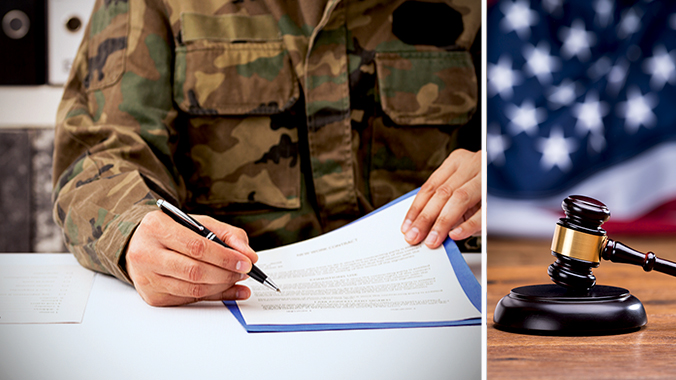Ethical Guidance for Working with Clients Facing Mental Health Issues

Carolyn Reinach Wolf is an Executive Partner in the law firm of Abrams Fensterman, LLP and Director of the firm’s Mental Health Law practice.

As Director of the Nassau County Bar Association Lawyer Assistance Program (LAP), Dr. Eckhardt provides confidential professional counseling services to lawyers, judges, law students, and their immediate family members who are struggling with mental health and substance use problems.
1.5 hour CLE
Tuition: $195.00
Get this course, plus over 1,000+ of live webinars.
Learn More
Training 5 or more people?
Sign-up for a law firm subscription plan and each attorney in the firm receives free access to all CLE Programs
Program Summary
This CLE program, “Ethical Guidance for Working with Clients Facing Mental Health Issues,” offers a comprehensive synopsis of the ethical responsibilities lawyers must uphold when representing clients dealing with mental health challenges and handling their own challenges.
Designed to address the unique issues that arise when clients experience diminished capacity or psychiatric conditions, the session will explore ethical considerations for maintaining client confidentiality, capacity assessments, and informed consent. Participants will gain valuable insights into the delicate balance between ethical obligations and practical advocacy for vulnerable clients, including strategies for working with healthcare professionals and navigating legal requirements. Addressing the mental health status of vulnerable clients is one of the many unique stressors that lawyers address in their practice.
This CLE will further discuss the importance of lawyer well-being. Participants will learn how to recognize the negative impact stress can have on the effective practice of law and will be provided with practical strategies to decrease stress and promote well-being.
Key topics to be discussed:
- Recognizing red flags signaling a mental health impairment
- Ethical responsibilities when assessing client capacity and competence – ABA Model Rule 1.14: Client with Diminished Capacity
- Navigating informed consent with clients experiencing psychiatric conditions
- Confidentiality and privileged communication with clients facing mental health challenges
- Balancing advocacy with the client’s best interests: When to involve guardians or conservators
- Collaborating with mental health professionals while maintaining ethical boundaries
- The importance of self-care and lawyer well-being
![]() Closed-captioning available
Closed-captioning available
Speakers
 Carolyn Reinach Wolf | Abrams Fensterman, LLP
Carolyn Reinach Wolf | Abrams Fensterman, LLP
Carolyn Reinach Wolf is an Executive Partner in the law firm of Abrams Fensterman, LLP and Director of the firm’s Mental Health Law practice. Supported by a team of expert clinicians, she specializes in navigating the complex landscape of legal issues utilizing her mental health toolkit including but not limited to, hospital admissions, mental hygiene warrants, case management, referrals to mental health out-patient services, Assisted Outpatient Treatment applications, and guardianship. She also represents institutions, mental health, healthcare higher education and related professionals. Ms. Wolf is a regular contributor to Psychology Today, was profiled by The New York Times in a 2013 story entitled, “A Guide in the Darkness,” which ran on the front page of the Sunday Edition Metro section and teaches Law and Psychiatry as an adjunct professor of law at Hofstra University School of Law. Ms. Wolf received a B.A. with honors from the University of Maryland, Master of Business Administration from Hofstra University, Master of Science in Health Services Administration from Harvard University, and a J.D. from Hofstra University School of Law.
 Elizabeth Eckhardt, LCSW, PhD | Nassau County Bar Association’s Lawyer Assistance Program
Elizabeth Eckhardt, LCSW, PhD | Nassau County Bar Association’s Lawyer Assistance Program
As Director of the Nassau County Bar Association Lawyer Assistance Program (LAP), Dr. Eckhardt provides confidential professional counseling services to lawyers, judges, law students, and their immediate family members who are struggling with mental health and substance use problems. Dr. Eckhardt also conducts outreach and education to law firms, law schools, and legal departments on topics such as substance use, mental health, suicide prevention, time management, stress management, wellness, and mindfulness. The LAP program provides early identification, crisis intervention, peer support, stress management, and monitoring services.
For more than 30 years, Dr. Eckhardt has been providing individual, couple, and family therapy through her private psychotherapy practice.
Dr. Eckhardt was recently honored with the 2023 Nassau County Bar Association’s President’s Award for her extraordinary efforts toward furthering the goals of the Nassau County Bar Association.
Agenda
I. Recognizing red flags signaling a mental health impairment | 1:40pm – 2:00pm
II. Ethical responsibilities when assessing client capacity and competence – ABA Model Rule 1.14: Client with Diminished Capacity | 2:00pm – 2:15pm
III. Navigating informed consent with clients experiencing psychiatric conditions | 2:15pm – 2:30pm
IV. Confidentiality and privileged communication with clients facing mental health challenges | 2:30pm – 2:40pm
Break | 2:40pm – 2:50pm
V. Balancing advocacy with the client’s best interests: When to involve guardians or conservators | 2:50pm – 3:00pm
VI. Collaborating with mental health professionals while maintaining ethical boundaries | 3:00pm – 3:10pm
VII. The importance of self-care and lawyer well-being | 3:10pm – 3:20pm
Credits
Alaska
Approved for CLE Credits
1.5 Ethics
Alabama
Pending CLE Approval
1.5 Ethics
Arkansas
Approved for CLE Credits
1.5 Ethics
Arizona
Approved for CLE Credits
1.5 Professional Responsibility/Ethics
California
Approved for CLE Credits
1.5 Ethics
Colorado
Pending CLE Approval
1.5 Ethics / Professionalism
Connecticut
Approved for CLE Credits
1.5 Ethics / Professionalism
District of Columbia
No MCLE Required
1.5 Ethics Hours
Delaware
Pending CLE Approval
1.5 Enhanced Ethics
Florida
Approved via Attorney Submission
2 Ethics Hours
Georgia
Approved for CLE Credits
1.5 Ethics
Hawaii
Approved for CLE Credits
1.5 Ethics / Professionalism
Idaho
Approved for Self-Study Credits
1.5 Ethics
Illinois
Approved for Self-Study Credits
1.5 Ethics
Indiana
Pending CLE Approval
1.5 Ethics
Kansas
Pending CLE Approval
1.5 Ethics / Professionalism
Kentucky
Pending CLE Approval
1.5 Ethics
Louisiana
Pending CLE Approval
1.5 Ethics
Massachusetts
No MCLE Required
1.5 Ethics Hours
Maryland
No MCLE Required
1.5 Ethics Hours
Maine
Pending CLE Approval
1.5 Ethics / Professionalism
Michigan
No MCLE Required
1.5 Ethics Hours
Minnesota
Approved for Self-Study Credits
1.5 Ethics
Missouri
Approved for Self-Study Credits
1.8 Ethics
Mississippi
Pending CLE Approval
1.5 Other (Ethics / Professionalism)
Montana
Pending CLE Approval
1.5 Professional Fitness and Integrity
North Carolina
Pending CLE Approval
1.5 Ethics
North Dakota
Approved for CLE Credits
1.5 Ethics
Nebraska
Pending CLE Approval
1.5 Professional Responsibility
New Hampshire
Approved for CLE Credits
90 Ethics / Professionalism minutes
New Jersey
Approved for CLE Credits
1.8 Ethics / Professionalism
New Mexico
Approved for Self-Study Credits
1.5 Ethics
Nevada
Approved for Self-Study Credits
1.5 Ethics
New York
Approved for CLE Credits
1.8 Ethics / Professionalism
Oklahoma
Pending CLE Approval
2 Ethics / Professionalism
Oregon
Pending CLE Approval
1.5 Ethics
Pennsylvania
Approved for Self-Study Credits
1.5 Ethics
Rhode Island
Pending CLE Approval
1.5 Ethics / Professionalism
South Carolina
Pending CLE Approval
1.5 Ethics Hours
South Dakota
No MCLE Required
1.5 Ethics / Professionalism
Tennessee
Pending CLE Approval
1.5 Dual
Texas
Pending CLE Approval
1.5 Ethics / Professionalism
Utah
Pending CLE Approval
1.5 Ethics / Professionalism
Virginia
Not Eligible
1.5 Ethics Hours
Vermont
Approved for CLE Credits
1.5 Ethics
Washington
Approved via Attorney Submission
1.5 Ethics
West Virginia
Pending CLE Approval
1.5 Ethics / Professionalism
Wyoming
Pending CLE Approval
1 Ethics / Professionalism
#1 CLE Access Program
- Over 1,000 Live CLE Webinars each year
- All CLE webinars broadcasted in last 12 months
- Programs covering over 35 practice areas
- Hot topics & changes in the law
- All formats: Live, Replay, and On-demand
- Accreditation in every state
Access every CLE webinar,
every format, all year long!
myLawCLE All-Access Pass
only $395 yearly
Register Now
#1 CLE Access Program
- Over 1,000 Live CLE Webinars each year
- All CLE webinars broadcasted in last 12 months
- Programs covering over 35 practice areas
- Hot topics & changes in the law
- All formats: Live, Replay, and On-demand
- Accreditation in every state
Access every CLE webinar,
every format, all year long!
myLawCLE All-Access Pass
only $395 yearly
Preview
More CLE Webinars
Trending CLE Webinars








Upcoming CLE Webinars





























































![Attorney–Client Privilege and Work Product: Managing Waiver Risk, Internal Investigations, Regulatory Scrutiny, and Third-Party Communications (2026 Edition) [Includes 1 Ethics hour]](https://mylawcle.com/wp-content/uploads/2026/01/Product_img_-Attorney–Client-Privilege-and-Work-Product.jpg)

